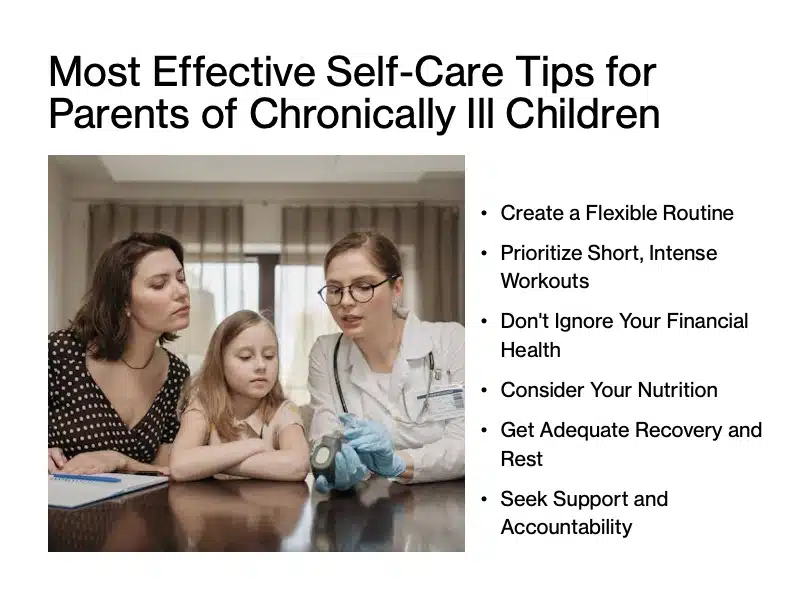Self-Care for Parents of Chronically Ill Children
Caring for a child with a chronic illness places immense emotional, physical, and psychological demands on parents.
The constant cycle of medical appointments, treatments, medication schedules, and unpredictable health crises can lead to chronic stress, caregiver burnout, and long-term health issues for the caregiver themselves.
Research shows that caregivers of medically complex children are at higher risk of anxiety, depression, cardiovascular problems, and immune dysfunction due to prolonged stress and lack of adequate self-care (Raina et al., 2005).
Without intentional strategies for managing their own health and well-being, parents may find themselves physically exhausted, emotionally depleted, and mentally overwhelmed, making it harder to sustain the energy and clarity needed to advocate and care for their child.
Maintaining a self-care routine isn’t selfish; it’s essential.
By integrating fitness, nutrition, rest, and emotional support into your caregiving lifestyle, you not only protect your own health but also build a stronger foundation from which to care for your child.
Self-care for parents of chronically ill children is an act of resilience that can positively influence the entire family’s well-being.
Why is Self-Care Important for Parents of Chronically Ill Children?
Self-care is not a luxury for parents of chronically ill children; it is a necessity for survival, stability, and sustainable caregiving.
Practicing self-care improves your ability to manage daily challenges and navigate the unpredictability of illness with greater patience, clarity, and emotional resilience.
When you’re the emotional anchor and primary decision-maker for your child’s health, your own well-being directly impacts your ability to provide consistent, compassionate care.
Chronic caregiving stress increases cortisol levels, weakens immune function, disrupts sleep, and contributes to long-term health risks such as heart disease, depression, and anxiety (Vitaliano et al., 2003).
Without regular attention to physical and mental health, many parents find themselves emotionally depleted, cognitively foggy, or even physically ill, jeopardizing their role as a steady support system for their child.
It allows you to remain present during medical appointments, advocate confidently during hospital stays, and maintain a nurturing presence at home.
Over time, it also helps reduce the risk of caregiver burnout, which is a serious condition that can lead to fatigue, isolation, and detachment from your child or family.
Incorporating self-care is also a powerful form of healthy role modeling, which is one of the most effective health and fitness tips for children.
Children, especially those with chronic conditions, often look to their parents for behavioral cues.
When you prioritize your health through balanced meals, regular movement, adequate rest, and seeking help when needed, you send a clear message that taking care of your body and mind is a lifelong priority, even during challenging times.
Most Effective Self-Care Tips for Parents of Chronically Ill Children

Balancing your own health with the constant demands of caregiving can feel impossible, but prioritizing small, sustainable habits makes self-care both realistic and impactful.
The most effective strategies aren’t about overhauling your life; they’re about integrating intentional practices into your daily routine that support your physical, emotional, and mental well-being.
Whether you have five minutes between appointments or a quiet hour after bedtime, there are meaningful ways to restore energy, reduce stress, and protect your health.
These self-care tips are specifically designed for parents of chronically ill children who need adaptable, efficient, and proven ways to care for themselves while continuing to support their child.
Create a Flexible Routine
Caregiving can easily disrupt your schedules as you try to balance various aspects of life.
A week can be filled with doctor appointments and another with staying late or coping with unexpected emergencies.
Flexibility is, therefore, what is most important in attempting to keep a fitness routine.
There are no specific times to exercise, but find opportunities that fit your day as it unfolds.
It is better to have weekly goals rather than daily ones.
Plan to exercise three times a week without specifying the days so you can adjust based on your child’s schedule.
You can go for a brisk walk or practice mobility exercises after the children have gone to sleep.
Being adaptable also translates to being kind to yourself.
Weeks will have tougher days than others, and one missed workout won’t put you off track.
Caregiving exercise is a marathon, not a sprint.
Long-term consistency is the aim, not day-by-day perfection.
Prioritize Short, Intense Workouts
Parents of chronically ill children should train realistically to avoid burning out.
You can consider push-ups, squats, lunges, and other exercises that can be done at home without requiring fitness equipment.
You can also include High-Intensity Interval Training (HIIT) workouts, where you do short bursts of intensive exercise with brief periods of rest.
For exercises like jumping jacks, in-place jogs, or burpees, timers can be set to switch between activities and rest periods.
Even a couple of minutes a day can have a noticeable effect over time and can be performed in the living room while the baby naps or plays.
Also value the seemingly minor activities, such as walking down the stairs, dancing to a favorite playlist, or stretching.
The aim is to eliminate the all-or-nothing mentality and realize that brief activity bursts can benefit your health and energy levels.
Don’t Ignore Your Financial Health
With bills, therapy, adaptive equipment, and specialty visits, expenses can quickly accumulate.
It’s easy to get so caught up in your child’s health care that you forget about your fiscal health.
Doing so can lead to long-term stress that impacts both your mental and physical health.
Begin by monitoring your expenses and where your money is going each month. Budgeting software or spreadsheets may give you insight and allow you to make informed choices.
You can also research areas of cost reduction without compromising your child’s care, such as enrolling in aid programs or group statement packaging.
If your child’s sickness was caused by negligence, for example, in a hospital, then you can seek justice to receive compensation.
One example is when during delivery.
The medical staff did not properly exercise care and caused cerebral palsy.
You can hire the services of a cerebral palsy attorney to sue the hospital for malpractice.
The compensation can help alleviate your financial well-being.
Consider Your Nutrition
Caregivers often skip meals or rely on quick, processed foods; however, consistent nutrition is essential for maintaining energy, immunity, mood, and long-term resilience.
Prioritize meals rich in lean proteins, fiber, healthy fats, and complex carbohydrates to support stable energy and emotional regulation.
Include micronutrient-dense foods like leafy greens, nuts, seeds, and colorful fruits and vegetables to help combat the effects of chronic stress.
One of the best kitchen hacks for busy caregivers is to prep simple ingredients, like pre-chopped veggies, cooked grains, and protein sources, that can be mixed and matched into healthy dinner ideas and other meals throughout the week.
Keep nutritious snacks on hand, such as trail mix, Greek yogurt, or hard-boiled eggs, to avoid the temptation of fast food when time is short.
Hydration is just as important.
Carry a reusable water bottle and incorporate hydrating foods like cucumber, celery, and watermelon to maintain fluid balance and mental clarity.
Proper hydration improves digestion, energy levels, and cognitive focus, which are vital during demanding caregiving days.
Get Adequate Recovery and Rest
Physical fitness mostly depends on rest, which is sometimes scarce for caregivers.
Chronic sleep deprivation not only lowers your physical endurance but also your mental health.
Even if you cannot get eight straight hours, giving sleep a top priority in innovative ways will significantly impact you.
You can also think about taking a nap while your child is sleeping.
Even twenty minutes may raise mood and alertness.
Establish a nighttime ritual that matches what you do for your child, like dim lights, soothing music, or light stretches.
These signals tell your brain it’s time to unwind, increasing your sleep quality even if the length is brief.
Seek Support and Accountability
Support systems are vital for motivation, accountability, and emotional resilience.
Whether it’s an online fitness group for parents of children with special needs, a trusted friend, or a local caregiver support circle, having others to lean on can reduce isolation and improve follow-through.
Community health resources, such as school-based mental health services, local parenting workshops, and caregiver wellness initiatives, can also provide guidance and emotional support.
These services often provide accessible counseling, referrals, or respite programs to help parents manage stress and maintain balance.
You can also explore fitness apps designed for busy caregivers or work with a virtual personal trainer.
Many platforms, such as the Team BeachBody BODi App, offer health tracking, flexible workouts, and encouragement to help you stay committed without leaving home.
Final Thoughts: How to Stay Healthy as a Parent of a Chronically Ill Child
Staying healthy as a parent of a chronically ill child means learning to value your well-being as part of your child’s care plan, not in opposition to it.
Your energy, clarity, and resilience are essential tools for navigating the emotional and logistical challenges of caregiving.
By prioritizing movement, maintaining balanced nutrition, staying hydrated, finding emotional support, and allowing yourself rest, you create a more sustainable foundation for both your own health and your child’s needs.
You won’t always get it perfect, but small, consistent actions add up over time.
Staying healthy as a parent of a chronically ill child requires intention and self-compassion, but it’s also one of the most important ways to keep showing up with strength, love, and purpose.
This website does not provide medical advice. This website site does contain affiliate links, and purchases may earn a commission.
Read my Medical Disclaimer, Review Disclaimer, and Publishing Policies for more details. Use of this site indicates acceptance of these terms.



